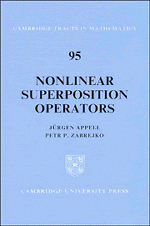Book contents
- Frontmatter
- Contents
- Preface
- Chapter 1 The superposition operator in the space S
- Chapter 2 The superposition operator in ideal spaces
- Chapter 3 The superposition operator in Lebesgue spaces
- Chapter 4 The superposition operator in Orlicz spaces
- Chapter 5 The superposition operator in symmetric spaces
- Chapter 6 The superposition operator in the spaces C and BV
- Chapter 7 The superposition operator in Hölder spaces
- Chapter 8 The superposition operator in spaces of smooth functions
- Chapter 9 The superposition operator in Sobolev spaces
- Bibliography
- List of Symbols
- Subject Index
Chapter 3 - The superposition operator in Lebesgue spaces
Published online by Cambridge University Press: 05 February 2012
- Frontmatter
- Contents
- Preface
- Chapter 1 The superposition operator in the space S
- Chapter 2 The superposition operator in ideal spaces
- Chapter 3 The superposition operator in Lebesgue spaces
- Chapter 4 The superposition operator in Orlicz spaces
- Chapter 5 The superposition operator in symmetric spaces
- Chapter 6 The superposition operator in the spaces C and BV
- Chapter 7 The superposition operator in Hölder spaces
- Chapter 8 The superposition operator in spaces of smooth functions
- Chapter 9 The superposition operator in Sobolev spaces
- Bibliography
- List of Symbols
- Subject Index
Summary
By reformulating the general results of Chapter 2, one gets many results on the superposition operator in Lebesgue spaces. On the other hand, the theory in Lebesgue spaces is much richer than in general ideal spaces. The most interesting (and pleasant) fact is that one can give an acting condition for F, in terms of the generating function f, which is both necessary and sufficient. It follows, in particular, that F is always bounded and continuous, whenever F acts from some Lp into Lq (for 1 ≤ p ≤ ∞, 1 ≤ q < ∞ and Ωd = Ø); the corresponding problems in the case Ωc = Ø are more delicate.
Apart from continuity and boundedness conditions, we provide a concrete “recipe” to calculate the growth function of the superposition operator on balls in Lp. Moreover, criteria for absolute boundedness and uniform continuity are given, as well as two-sided estimates for the modulus of continuity of F.
As immediate consequences of some results of the preceding chapter, we get that F is weakly continuous from Lp into Lq if and only if f is affine in u. Further, it turns out that the Darbo or Lipschitz condition for F is equivalent to a Lipschitz condition for the function f with respect to u. Holder continuity of F is also briefly discussed.
Another pleasant fact concerns differentiability: in Lebesgue spaces one can give conditions for differentiability, asymptotic linearity, and higher differentiability which are both necessary and sufficient.
- Type
- Chapter
- Information
- Nonlinear Superposition Operators , pp. 89 - 118Publisher: Cambridge University PressPrint publication year: 1990
- 1
- Cited by

